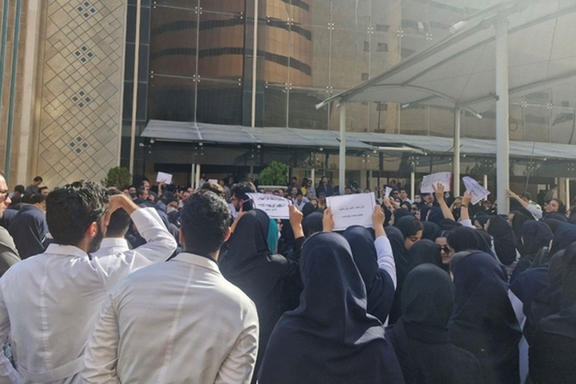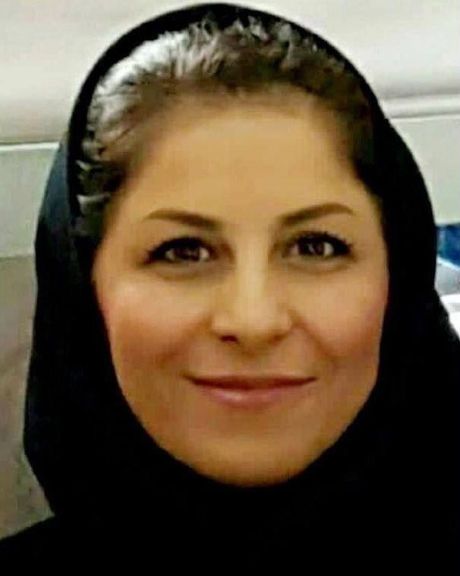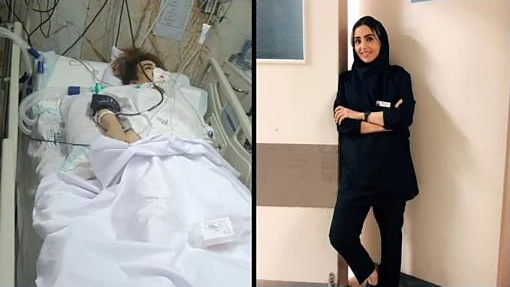Iranian nurse in coma after arrest amid crackdown on protests

Iranian authorities have ramped up their crackdown on nationwide nurses' protests, resulting in multiple arrests and one nurse falling into a coma after her detention.

Iranian authorities have ramped up their crackdown on nationwide nurses' protests, resulting in multiple arrests and one nurse falling into a coma after her detention.
Among those detained is Firoozeh Mojrian-Shargh, a nurse at Qaem Hospital in Mashhad, who was arrested on Tuesday night by security forces. Shortly after her detention, Mojrian-Shargh fell into a coma, raising serious concerns about her treatment in custody.
Mojrian-Shargh remains in critical condition in the ICU, her case drawing parallels to the tragic death of Mahsa Amini, who received traumatic head injuries and died after being detained by Iran’s morality police in 2022. Her death sparked widespread protests that lasted until early 2023 during which security forces killed atleast 550 people.

The crackdown is part of a broader effort by Iranian authorities to suppress the growing protests, which began on August 5 and have since escalated into widespread strikes affecting around 50 hospitals and medical centers across seven provinces. Nurses, frustrated by the government's unfulfilled promises and unpaid wages. They have been chanting slogans such as "We've heard many promises, but seen no answers" and "Our patience has run out."
In addition to Mojrian-Shargh, Zahra Tamadon, the head nurse of Ward 10 at Masih Daneshvari Hospital in Tehran, was detained on Wednesday, along with several other nurses.

According to Norway-based rights group Hengaw, her arrest may be linked to the recent protests and strikes. Additionally, two protesting nurses were arrested in Arak, further illustrating the sweeping nature of the crackdown. According to information received by Iran International, at least 18 protesting nurses have been summoned to security agencies in recent days across various cities.
Despite the intensified crackdowns, nurses in several Iranian cities, including Khorramabad in western Iran, Babol in the north, Khomeyni Shahr in central Iran, and Sabzevar in the northeast, launched a fresh wave of strikes and rallies on Saturday, continuing their demands for better pay, elimination of mandatory overtime, and improved working conditions.
The protests gained momentum after the death of 32-year-old nurse Parvaneh Mandani on August 2, reportedly due to over-work-induced Karoshi syndrome, which has become a rallying point for healthcare workers.
Meanwhile, reports emerged on Friday that another Iranian nurse, Elaheh Kazemi, has fallen into a coma due to extreme work-related stress.

Kazemi, who worked in clinics in Tehran, had been suffering from severe fatigue and body pain, which led her to frequently use painkillers. Her brother shared in an Instagram video that Kazemi has been unconscious for five days and is currently hospitalized at Loghman Hakim Hospital in Tehran.
These incidents highlight the dire working conditions faced by healthcare workers in Iran. Mohammad Reza Sharifi-Moghaddam, Secretary-General of the Nursing House, revealed that in just one month, three nurses died in their sleep, deaths attributed to "Karoshi syndrome," a condition caused by extreme overwork.
Iran’s new Health Minister, Mohammad Reza Zafarghandi, admitted that the government owes nurses a staggering 75 trillion rials (approximately $117 million) in unpaid wages but offered only vague assurances that the payments would be made “as soon as possible.” That amount is a huge sum in Iran where nurses earn just $200 a month.
As Iran’s healthcare crisis deepens, the state’s prioritization of suppressing dissent over addressing the systemic issues driving the nurses' protests underscores a broader strategy focused on maintaining control rather than resolving the underlying problems that have led to widespread unrest.